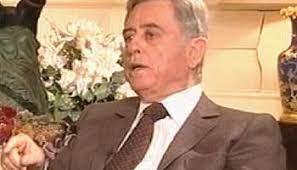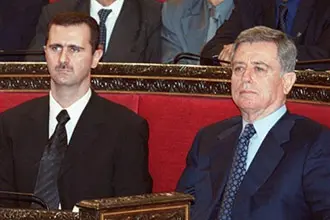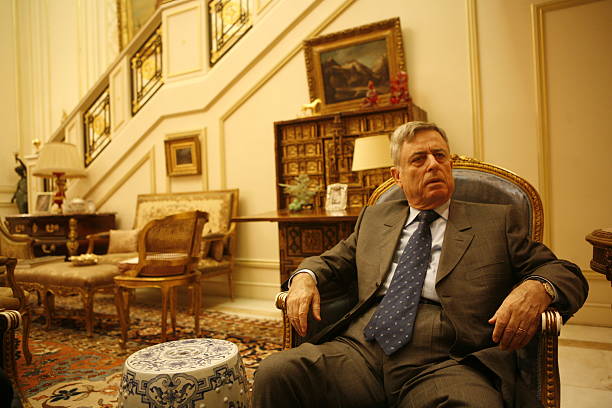He declared his defection from Paris, stating that he made the decision to prioritize the country over the regime. He issued a cautionary warning, emphasizing that there are extremely grave concerns. Khaddam highlighted that Assad possesses an emotional and idiosyncratic leadership style that has led Syria into a dangerous and precarious situation akin to a minefield
“Syrian Vice President Abdul Halim Khaddam held President Bashar al-Assad responsible for Syria’s involvement in the current landmine crisis due to his monopoly of power, refusal to implement reforms, and his tendency to act impulsively. Khaddam also revealed several threats personally directed by Assad and the head of Syrian intelligence in Lebanon, Rustum Ghazaleh, to the late Lebanese Prime Minister Rafik Hariri months before his assassination.
Khaddam warned of any harm that might befall him and his family, stating, ‘I have a lot to say, but I don’t say it for the sake of the country. Whoever thinks otherwise should know that I have important and dangerous matters and files.’ He also disclosed that his family had come to Paris to spend the holiday season with him.
During an interview with Al Arabiya TV, Khaddam discussed the role of Rustum Ghazaleh and how he insulted both Hariri and Lebanese politicians Nabih Berri and Walid Jumblatt. Khaddam revealed that Assad demanded Ghazaleh’s dismissal for disrespecting him, which eventually led to Ghazaleh’s forced apology after blaming Syrian President Ghazi Kanaan for the situation in Lebanon. Khaddam informed Assad that Ghazaleh had stolen $35 million from the Bank of the City, labeling him a “thief.”
Khaddam stated that on February 28, after Hariri’s assassination, he asked Assad to remove the criminal Ghazaleh from Lebanon and eliminate him because he created the current situation. Assad responded, ‘Tomorrow there will be changes, and he will be removed.’ Khaddam also revealed that he urged Assad to form an investigation committee after stating in the People’s Council that mistakes had been made in Lebanon and that the officers responsible for the situation should be held accountable. However, Assad handed Ghazaleh new responsibilities in the Damascus countryside, which affected Lebanon despite the crimes he committed.
Severe threat
Khaddam recounted visitors’ accounts of Ghazaleh playing with his gun and saying, ‘I will do this and that,’ indicating dangerous statements made about Prime Minister Hariri. On one occasion, a few months before his assassination, Hariri was summoned to Damascus and was threatened by Assad in the presence of Ghazaleh, Kanaan, and Adnan Kholuof, with extremely harsh words.
Khaddam criticized Assad for making such remarks to the Lebanese Prime Minister in front of junior officers. It was at that moment he realized his mistake and asked Khaddam to contact Hariri to resolve the issue left with the Lebanese President.
Khaddam also quoted Assad saying that he wouldn’t allow anyone to defy his decisions in Lebanon. He mentioned that Hariri’s pressure increased after the meeting, causing him to have a nosebleed. Khaddam described how Kanaan took him to his office and attempted to calm the situation. Khaddam also mentioned the Syrian leadership’s sentiments against Hariri, such as claiming that he was orchestrating an unprecedented act in Lebanon by uniting his sect around him, which they perceived as a threat to Syria. In response, Khaddam asked, ‘Are Hezbollah, Berri, and Aoun also a threat to Syria because they gather their respective sects?'”
He revealed that he had asked Hariri to leave Lebanon through Mohsen Dalloul, a Lebanese minister. This was because Hariri’s situation in Syria had become complicated months before his assassination. He emphasized that he had never considered the possibility of Syria assassinating Hariri. Consequently, this situation created certain impressions among the people. The results of the International Commission’s investigation, led by Meles, serve as evidence of this situation.
The Syrian Vice President repeated multiple times that “we have to wait for the investigation,” emphasizing that no individual in Syria can make a unilateral decision. President Bashar stated this in his interview with “Der Spiegel” when he said, “Accusing Syrians who are involved means I am involved.”
He discussed the phase of President Hariri’s relationship with the late President Hafez Al-Assad. The latter believed that Syria and Lebanon needed Hariri and that he should not be weakened. President Lahoud rejected Hariri’s request to be his prime minister, and President El-Hoss assumed the position instead.
Syrian Vice President Lahoud, Jamil Al-Sayed, and the Lebanese agencies were held responsible for the harsh campaigns against Hariri. These campaigns had an impact on President Bashar. He confirmed that the late president had dealt positively with Syria, making certain concessions to avoid angering the Syrian leadership.
He reiterated that significant threats were made to Hariri. He described how reports were fabricated, claiming that former Foreign Minister Jean Obeid had a secret meeting with the American ambassador in his car, despite Obeid being a friend of Syria. The reports from the Lebanese agencies were authenticated, and Obeid faced a boycott. He emphasized that the accusation was baseless because Obeid could have invited the ambassador to the ministry.
He attributed all this incitement to the circle surrounding Lahoud.
He considered raising the case of Abu Adas and the pilgrims accused of the bombing as foolish. The bombing required 1000 kilograms of explosives and techniques to interfere with the devices carried by Hariri’s cars. Could Abu Adas carry out an operation of this magnitude? Furthermore, where is his body and remains? All of this necessitates advanced technology, a complete apparatus involving at least 20 individuals, and management of such a large operation. This surpasses the capabilities of a small organization. No one can accomplish all of this, neither Ahmed Abu Adas nor Ahmed Abu Hummus. There is a larger apparatus behind it. Who is behind it? This is what the investigation will uncover.
He recalled the statements of pro-Syrian leaders (Franjieh, Karami, Qansuh, Wahab) during their malicious campaign against President Hariri.
He described the report of the international investigator Meles as professional and technical. As a lawyer, he noted that Meles provided a summary of the available information, as he couldn’t disclose everything due to its potential impact on the integrity of the investigation. He accused those who claimed that the report was politicized, stating that it was the suspects themselves who had exploited the investigation.
He reiterated his opposition to Lahoud’s presidency and the subsequent extension. He highlighted that he had conveyed to the late President Hafez Al-Assad that Lebanon couldn’t tolerate military rule, emphasizing the serious repercussions it would have on Syria. He pointed out that Bashar Al-Assad informed him on August 18 that there would be no extension. Hariri informed him that “your group changed their mind. They called me for a quarter of an hour and informed me.”
He stated that he advised Hariri to either accept the extension or resign, as he couldn’t bear the consequences of it. Jumblatt also provided the same advice to Hariri.
Assad’s policy
Khaddam spoke in detail about President Bashar Al-Assad’s mistakes and anticipated that those around him would incite him against Khaddam, especially those who misguided him. He mentioned his long-standing efforts to advocate for Syria and his experience of surviving five assassination attempts.
He mentioned that he came to Paris to write his memoirs. He praised Assad’s politeness in his interactions with others and recalled their meeting before Khaddam’s departure for Paris. He acknowledged differences in viewpoints but highlighted mutual respect. He stated, “I left Syria for the sake of Syria.”
He recounted his acquaintance with President Bashar since 1992 when his father introduced them for inheritance matters. He stated that he agreed with Bashar on political and economic reforms and supported the path towards democracy. He shared his expertise and presented a study on party development, political systems, establishing democracy, safeguarding freedoms, and addressing the economic crisis. He noted, “This memorandum represents a strategy, and I believe that if President Bashar Al-Assad had adopted this strategy, Syria would not have faced these internal and external difficulties. The biggest problem arises when the state lacks a political direction, leading it towards potential pitfalls.”
He discussed how all the reform proposals were disregarded by the Cabinet and how the plan for a French mission, requested by President Chirac to modernize the administration, was blocked. He revealed his decision to resign due to the stagnation of reforms. He added, “I found myself faced with two options: to stand with the country or to stand with the regime. I chose the country because the regime is a temporary situation.”
He stopped when Bashar was in power, and he noticed that decision-making had become centralized, absent from constitutional institutions and the party. Their role had become merely to cover up the president’s decisions. Additionally, reforms were suspended, and corruption had increased to the extent that a close employee received a monthly pension of 200 pounds while possessing a wealth of 4 billion dollars. He revealed that another relative owned 8 billion dollars, while half of the Syrian population lived below the poverty line and the other half barely above it. Meanwhile, a few relatives controlled the country’s resources, while Syrians struggled to find enough food, with some resorting to scavenging through garbage. He emphasized that Syria cannot withstand external pressure while the people’s freedom is restricted and controlled by the security services. Khaddam accused the security services of obstructing reforms and representing the old guard to shield the president from accountability for rejecting reforms.
He discussed how the small circle around President Assad had misled him into believing that the United States would come crawling to negotiate with him, citing the U.S.’s supposed indifference towards Lebanon compared to Iraq. This misinterpretation had led to grave consequences and plunged Syria into significant challenges.
He criticized the president for his emotional and reactive policies, highlighting that these were negative traits for any government official, as they hinder the ability to differentiate right from wrong. He contrasted this with his father, the late President Hafez Al-Assad, who had displayed self-control and avoided impulsive reactions. This quality was vital for effectively managing the country.
He denied having any direct connection with Asif Shawkat or Maher Al-Assad. He pointed out that Farooq al-Shara had involved Assad in Resolution 1559. He refuted the notion of a disagreement between him and Shara during the Qatari leadership meeting, as the political committee within the leadership had rejected Shara’s report. He added, “I don’t want to lower myself to Farooq al-Shara’s level and claim that there was contact with him.”
He stated that the situation in Lebanon had negatively affected Ghazi Kanaan, as he was being held responsible for the deteriorating conditions in Lebanon.
The Syrian Vice President recounted that after Hariri’s assassination, he met with President Bashar Al-Assad and informed him, “The individual responsible for bringing Hariri from Lebanon and decapitating him is Rustam Ghazaleh.” Assad responded by stating that there would be military reshuffling, and they would withdraw Ghazaleh from Lebanon. However, instead of punishing Ghazaleh, the Syrian president granted him more authority and made him a member of the Baath Party leadership. Regarding the suicide of Ghazi Kanaan, the former Syrian Vice President, it was suggested that the circumstances and intense pressure he faced may have contributed to his decision, although Khaddam did not confirm this. He emphasized the need for a thorough investigation to uncover the truth surrounding Kanaan’s death.
Khaddam mentioned that he learned that Brigadier General Rustam Ghazaleh, the former head of Syrian intelligence in Lebanon, had insulted President Rafik Hariri, President Nabih Berri, and MP Walid Jumblatt. When Khaddam requested that Assad hold Ghazaleh accountable and remove him from Lebanon, Assad acknowledged that Ghazaleh had also insulted former President Najib Mikati and Minister Suleiman Franjieh.
According to Syrian Vice President Abdel Halim Khaddam, President Bashar Al-Assad accused Rustam Ghazaleh of building a palace and a market in his village, as well as exploiting Najib Mikati and Suleiman Franjieh. Assad’s response was, “If he insults your friends, why don’t you bring him here and decapitate him?” Assad stated that he would relocate Ghazaleh within new formations, although this did not materialize.
Regarding Ahmed Abu Adass, Khaddam dismissed the notion as extremely foolish, just as the theory involving the pilgrims was baseless. He questioned the capability of any organization to procure a thousand kilograms of explosives, emphasizing that neither Ahmed Abu Adass nor Ahmed Abu Hummus possessed the resources for such a major operation. Khaddam expressed confidence that the investigation would shed light on the truth behind these events



